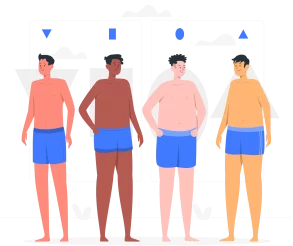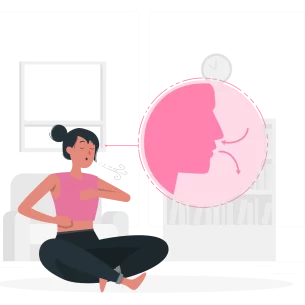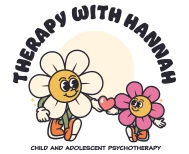Perhaps you have observed changes in your child’s eating behaviours, exercise patterns, or self-esteem, which have sparked concern? If so, it is important to trust your instincts and seek support, as recognising the signs early on is crucial for timely intervention.
Navigating concerns about a potential eating disorder can be an incredibly daunting experience. It's natural to feel a range of emotions—fear, uncertainty, and concern for your child's well-being. A lot of the time, fear plays a huge role in the way eating disorders work, and their effects on the family, and this can make it feel scary to take that next step. However, my aim is for us to work together to fight against that fear and help your child to regain a healthy relationship with food, their body, and ultimately, with themselves.


I think my child is struggling with their eating – why should I choose Therapy with Hannah to support my child?
While I offer comprehensive therapeutic support across a spectrum of difficulties, my specialisation lies in guiding young individuals through the intricacies of eating difficulties, whether they have been diagnosed with an eating disorder or are displaying atypical eating patterns.
With ten years of dedicated experience in the field of eating disorders, I bring a wealth of knowledge and expertise to my practice, ensuring an unparalleled approach to your child's recovery. This extensive experience positions me to offer nuanced, evidence-based interventions aimed at addressing underlying issues, cultivation of healthy relationships with food, and the development of effective coping strategies. This experience is a result of my academic journey, practical experiences in the workforce, and continuous professional development, providing me with a well-rounded understanding to addressing the unique challenges faced by children and adolescents.
Therefore, if you find yourself questioning your child’s relationship with food, exercise, or body image, take comfort in knowing you’ve chosen the optimal space for them to explore these difficulties. By entrusting your child's care to me, you are ensuring they receive comprehensive, evidence-based support tailored to their specific needs. My commitment to your child's well-being extends beyond mere treatment – it encompasses empathy, understanding, and a dedication to their long-term recovery journey.
Getting help! Who can access Therapy with Hannah eating disorder services?


I provide therapeutic support to children and adolescents who have either received a specific diagnosis of an eating disorder, or who are navigating challenges related to disordered eating behaviours or body image concerns.
Specific diagnoses that I work with include:
- Anorexia Nervosa (AN)
- Bulimia Nervosa (BN)
- Binge Eating Disorder (BED)
- Avoidant-Restrictive Food Intake Disorder (ARFID)
- Orthorexia Nervosa (ON)
- Other Specified Feeding or Eating Disorder (OSFED)
- Obesity
What to expect?
As an integrative therapist, I bring a dynamic, adaptable, and versatile approach to the treatment of eating disorders, drawing from various therapeutic modalities and frameworks to tailor treatment to your child’s needs. Recognising the richness of human diversity and the complexities of lived experiences, I embrace the idea that there is no one-size-fits-all solution. Instead, I aim to blend the most impactful elements of various therapeutic models and develop a personalised treatment plan that resonates deeply you’re your child’s distinct experiences, preferences, and character. This will depend on my professional assessment, your child’s age and developmental level, and, of course, your child’s preferences.
This treatment plan may include:

Talking therapy
Talking to a therapist, although initially challenging, can provide remarkable benefits for your child. For instance, sharing their thoughts out loud, even if it feels a bit jumbled at first, can be like turning on a mental flashlight – it helps clear away the confusion and makes everything feel a bit lighter and easier to understand. Saying things out loud can also make them feel less frightening, whereas keeping them inside only allows them to build up and get more confusing.

Art therapy
Art therapy is a therapeutic approach that utilises the creative process to improve and enhance the physical, mental, and emotional well-being of children and adolescents. In this form of therapy, your child may choose to express themselves, and communicate their thoughts and feelings, through various art forms, such as drawing, painting, and collaging. The emphasis is not on the final product, but rather on the process of creating and the emotions and insights it may evoke. Art therapy provides a non-verbal, and thus often more accessible, means of self-expression, allowing your child to explore complex emotions that they may find challenging to convey through words alone.

Mind-body connection
I may help your child to explore their mind-body connection, which is powerful in treating eating disorders. This may involve the introduction of mindfulness or progressive muscle relaxation, emphasising the importance of understanding how emotions, thoughts, and physical sensations are interconnected, thus contributing to a holistic approach to both physical and mental wellbeing.

Play therapy
Play Therapy offers a specialised approach to therapy, whereby children can express themselves and work through their difficulties using their natural language of communication, play, instead of words. Children are not always able to articulate their experiences, and thus play therapy offers a unique opportunity to communicate via showing rather than telling, which can often feel safer and less intense. I will provide a safe and engaging environment where your child can communicate their thoughts, feelings, and experiences using toys, games, and imaginative play. This unique form of therapy can help your child to navigate and make sense of their emotions, develop essential coping skills, and overcome various challenges. Through play therapy, your child can enhance self-awareness, improve communication, and build emotional resilience, offering a valuable avenue for addressing and managing a range of emotional and behavioural issues.

Dietetic intervention
In certain cases, collaboration with a dietitian may be necessary, and therefore I work closely alongside a registered dietitian. This multidisciplinary working allows for a comprehensive approach, ensuring that both the therapeutic and nutritional aspects of your child’s eating disorder are seamlessly integrated, providing a robust and well-rounded approach to treatment.

Addressing Childhood Eating Difficulties
In developing a tailored, effective, and evidence-based treatment plan, I will adeptly integrate the aforementioned elements to address your child's specific needs. While I am confident in my ability to determine the most effective combination, I highly prioritise both your input and your child's preferences. This collaborative approach ensures that the chosen treatment strategy aligns seamlessly with your child's unique approach to recovery from their eating difficulties.
To ensure I can adapt and tailor interventions to best suit the unique circumstances and goals of your child, I combine elements of:

Acceptance and Commitment Therapy (ACT)

Dialectical Behaviour Therapy (DBT)

Compassion-Focused Therapy (CFT)

Cognitive Behavioural Therapy (CBT)

Attachment and Systemic approaches

Humanistic modalities

Person-Centred Therapy

Psychodynamic Therapy

Transactional Analysis
Additional service –
Online meal support

In conjunction with therapeutic sessions, I also extend my services to offer specialised online meal support sessions. This service is a pivotal component of eating disorder treatment tailored for children and adolescents as it allows me to provide invaluable assistance during the most critical aspect of your child’s recovery – mealtime.
Meal support, in the context of eating disorder treatment, involves providing structured assistance, guidance, encouragement, and psychoeducation during meals, to empower your child in making healthier choices around food. The primary goal is to support your child in establishing a regular and balanced eating routine, normalise eating habits, and address any anxiety or challenges related to food. Overall, meal support contributes to the restoration of healthy eating patterns, improved nutritional intake, and the development of a positive and sustainable relationship with food. It provides a comprehensive and collaborative framework that not only addresses their immediate challenges, but also equips your child with the skills and resilience needed for long term recovery.
Eating disorder therapy and eating disorder meal support are distinct yet complementary components of a comprehensive treatment plan. Both treatments work synergistically to provide a well-rounded approach, addressing the complexities of eating disorders from different angles and promoting a more comprehensive path to recovery. I strongly encourage the integration of both eating disorder therapy and meal support to ensure a holistic and effective approach to your child’s recovery.

What are the next steps?
Contact me
If you think your child could benefit from my services, please reach out to me via email or by using the contact form located at the bottom of this page. Please indicate if you would like to access counselling/ psychotherapy for eating disorders, meal support sessions, or both.
Complimentary phone/video call
(15 minutes)
Once I have received your message, I will review the information and contact you to arrange a complimentary 15-minute phone/ video call for further discussion. This call can be conducted with you, your child, or both of you together. During this call, you will have the opportunity to briefly outline your child's presenting difficulties and ask any questions you may have. Following this, we can discuss your preferences for face-to-face or online therapy, and assess session availability. If you would like to go ahead with the process, we can then proceed to scheduling your child’s initial eating disorder assessment.
Initial Eating Disorder Assessment
(2 hours)
Although the subsequent therapy sessions will be 50-minutes each, this assessment session extends to 2 hours, allowing for a more thorough exploration of your child's presenting difficulties. It serves as an opportunity to begin to establish a therapeutic relationship, explore the historical context of your child’s eating difficulties, discuss factors that are maintaining these challenges, review any past interventions, and discuss treatment goals, allowing for a holistic understanding of your child’s wellbeing. Various assessment tools, such as questionnaires and observations, will also be utilised to gather comprehensive information. The information gathered guides the formulation of a personalised treatment plan, ensuring that subsequent sessions are tailored to address your child's specific needs. Additionally, this session welcomes your input on preferences for the therapeutic journey ahead, fostering a collaborative and effective approach.
Your child has the autonomy to decide whether they would prefer you to be present for the entirety/ part of their assessment, however, if your child is under the age of 16, I kindly request that you join for the first 10 minutes to provide consent for therapy.
If possible, please bring your child’s current weight and height measurements to the assessment as this information provides essential data for evaluating your child’s physical wellbeing. If your child does not usually weigh themselves, or if they become distressed knowing their weight, please conduct a blind weighing by asking them to close their eyes or step backwards onto the scales. Conversely, please arrange an appointment with your GP to obtain this information.
Psychotherapy/counselling sessions
(50 minutes)
and/ or meal support sessions
(snack – 30 minutes,
meal – 60 minutes)
Following the assessment, your child’s sessions will commence. Collaboratively, we will develop a plan to support your child in achieving their goals and determine the most suitable therapeutic approach for their needs. The number of therapy sessions are not fixed; we will schedule a review session every six weeks, where we can discuss your child's experience, assess the helpfulness of the sessions, and explore any desired changes.
Ad hoc parental review/ support
(telephone - 30 minutes)
I strongly believe that, with the child’s consent, family involvement in the therapeutic process can be instrumental in the recovery process of children and adolescents. I hold that involving family members can help to create a supportive environment at home, encouraging open communication and understanding. Therefore, I offer 30-minute telephone calls with parents/carers to review, offer support, or provide psychoeducation to support recovery.
Disclaimer: While I warmly welcome family involvement, it's important to highlight that I am committed to maintaining the confidentiality of your child. Respecting their privacy is a priority in our work together, and therefore, this will always be discussed with your child prior to commencement. This approach ensures that I uphold ethical standards, foster trust, and honour the autonomy of your child throughout the therapeutic journey.
A final disclaimer…
While I bring my expertise to these sessions, it's important to note that there is no guarantee that I will be able to persuade your child to eat, and/or alter their eating habits. Ultimately, the decision to eat remains a personal one for your child. My role is to create a supportive environment, offer guidance, and equip both you and your child with tools to navigate the challenges of disordered eating behaviours. The goal is to foster a positive relationship with food while respecting your child's autonomy in making decisions about their own well-being.
Where can I access Therapy with Hannah services?

While my practice is located in High Wycombe, Buckinghamshire, my practice is easily accessible for individuals residing in various locations:
Buckinghamshire: High Wycombe, Beaconsfield, Marlow, Aylesbury, Princes Risborough, Chesham, Great Missenden, Hazlemere, Wendover, Stokenchurch, Prestwood, Amersham, Gerrards Cross, Milton Keynes
Oxfordshire: Thame, Henley-on-Thames, Bicester
Berkshire: Maidenhead, Reading, Slough, Windsor, Wokingham
Hertfordshire: Tring, Berkhamsted, Hemel Hempstead
Bedfordshire: Dunstable, Luton

Additionally, to enhance convenience and comfort, I extend my services to offer an online service, where your child can access therapy through video calls, phone calls, and instant messaging.
There is also the flexibility to personalise your child’s therapy experience by choosing a blend of both online and face-to-face sessions.
What do other people think of Therapy with Hannah services?
Take a look at feedback from previous clients to get an insight into their experiences with this service!
Get In Touch
Feel free to contact me if you have any questions or to arrange an initial appointment.
You can also call me on +44 7919 887206 if you would prefer to leave a message or speak to me first.
All enquires are usually answered within 48 hours, and all contact is strictly confidential.
